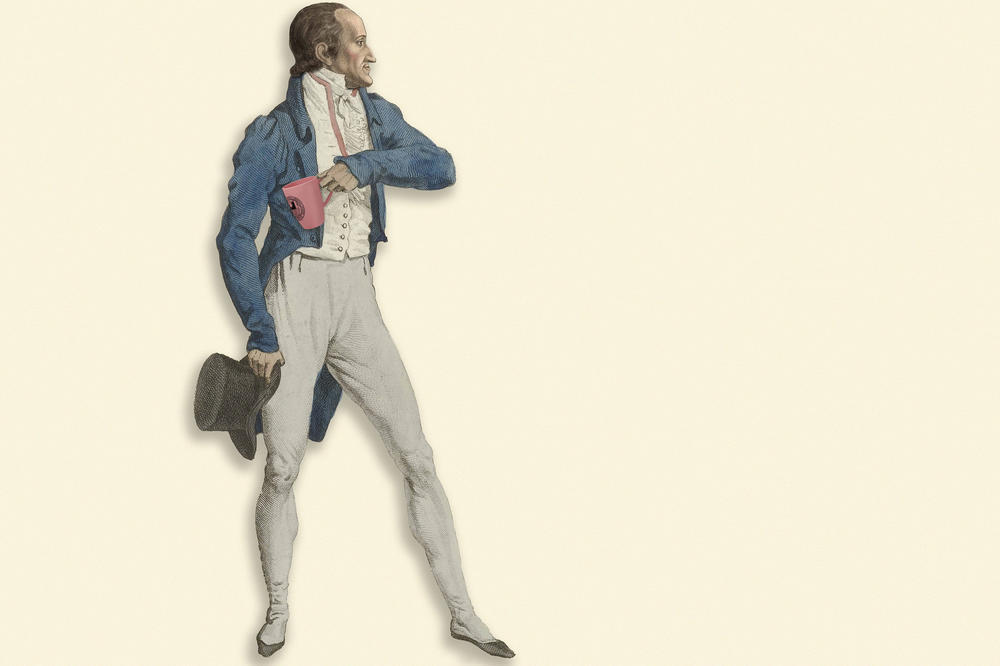Knigge Makes the Rounds
How do we treat each other – at work, during seminars, on social media? A famed etiquette guide is once more a topic of reading, discussion, and heightened visibility at Freie Universität.
Jun 05, 2019
Etiquette around campus: A life-size cardboard figure of Adolph Freiherr Knigge, author of the most celebrated work on etiquette in German, holding a Freie Universität mug invites viewers to join the conversation about how people treat each other.
Image Credit: Melanie Wiener
“Everyone in Germany has heard of Knigge, but hardly anyone has actually read the book,” says Anita Traninger, a professor of Romance languages and literatures at Freie Universität Berlin. Making the book behind the well-known name familiar and rediscovering it for the present day is the goal for Traninger and the team behind the #kniggegehtum project, which was launched by the Dahlem Humanities Center.
Adolph Freiherr Knigge’s 1788 treatise Über den Umgang mit Menschen (On Human Relations) is not a collection of rules of etiquette, contrary to what many people today associate with the Knigge name. “Knigge” is even used as a synonym for rules of conduct, and many books offering advice on etiquette use the name in their titles.
“Knigge was an Enlightenment author. To him, good behavior was a self-education project,” Traninger explains. “His book is a guide to how we think about ourselves and how we can manage our own behavior upon reflection. This Enlightenment aspect is important to us.”
Project includes all members of the university community
What makes this project special is that it involves all members of the university community, says Katja Heinrich, head of the new “Temporal Communities” Cluster of Excellence. She suggested Knigge’s book when the university was preparing to enter the “Eine Uni – ein Buch” (“One University – One Book”) competition organized by Stifterverband and the Klaus Tschira Foundation in cooperation with the ZEIT publishing group.
The project was one of ten winners from across Germany. The team can now use the funding awarded to prompt people to reflect on human relations over the next year, on campus and in public life. The initiative is scheduled to kick off on June 15, with the Long Night of the Sciences.
“What are we doing at the Long Night of the Sciences? We’re reading the book!” Traninger says. Members of Freie Universität – administrative and research employees, students, and President Günter M. Ziegler himself – will be reading their favorite passages from Knigge’s book out loud every hour on the hour from 5 to 9 p.m. in the “Theaterhof” courtyard (behind lecture halls 1a and 1b, Habelschwerdter Allee 45).
Scholars will offer insight into their research topics surrounding the subjects of honesty and politeness – but also hate and aggression – in brief talks at 5:30, 6:30, 7:30 and 8:30 p.m. Visitors can also take a playful approach to the subject with a wheel of fortune (5 to 9:30 p.m.), and kids are welcome to participate in “Knigge for Kids” (6 p.m.).
“One of the highlights of the Long Night of the Sciences is our video, which features members of Freie Universität from various areas. They talk about how we come together, not only at Freie Universität, but also outside the university, how we treat each other, how we talk to each other and work together. The many perspectives we have collected in interviews are exciting, and they’re also an outstanding starting point for our year of Knigge,” Heinrich says. She worked on the concept for the video with Simon Godart, who recently finished his doctorate at the Friedrich Schlegel Graduate School of Literary Studies. The 90-minute video, which was made by film student Johannes Sima, will play on a loop from 5 to 9:30 p.m. in lecture hall 1b, where a big screen has been set up and seating has been arranged stadium-style to mimic a movie theater.
Social media will also be part of the Knigge project
Social media will also be part of the Knigge project in the weeks and months to come. “In digital media, we still communicate as if we were talking to each other in many cases, but the medium is a written one,” Traninger says. “We need to learn new ways to navigate these encounters, because there is often a feeling that people are yelling at each other on digital platforms.”
In his own day, Knigge advised readers to be even more careful when dealing with others in writing than in speech: “A single indelible written word,” he wrote, had “destroyed many a person’s tranquility and, often, a family’s peace for ever.” While “an overhasty spoken word is forgotten,” a written one can still “cause mischief” 50 years on.
Godart sees a link between thinking about digital rules of politeness and his own favorite chapter of Knigge’s book, “Über den Umgang mit sich selbst” (“On relations with oneself”): “If you view yourself as a person you should treat politely and with care, that can open up another perspective on digital communications.”
The team plans to spark discussion of good manners online during the winter semester, chiefly on Twitter, Facebook, and Instagram. All the activities will be combined under the #kniggegehtum hashtag. Traninger and Godart have also designed a lecture series for the “Open Lecture Halls” for this winter semester. The program will focus on civility and politeness from an intercultural and interdisciplinary perspective.
And for those who want to discuss Knigge and etiquette further on the Long Night of the Sciences on June 15, there will be plenty of opportunity: Starting at 9:30 p.m., the Dahlem Humanities Center invites visitors to attend a summer festival in the Theaterhof courtyard, featuring music and cocktails – and time to talk to others in a relaxed setting.
This text originally appeared in German on June 8, 2019, in the Tagesspiegel newspaper supplement published by Freie Universität.

